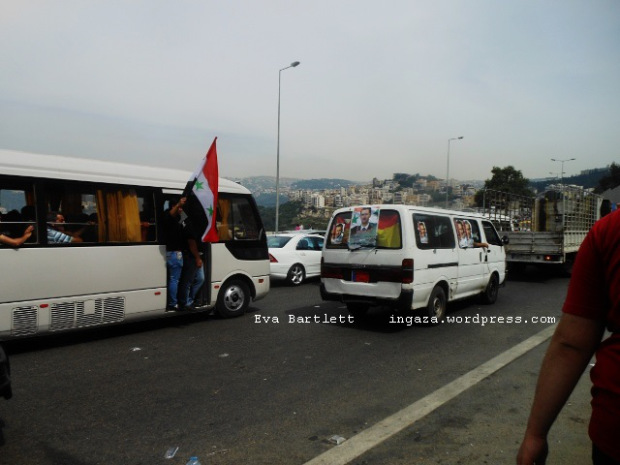Roughly three kilometres north of Beirut’s Syrian embassy in Baabda, Syrians crammed in one of an endless stream of buses, exited and continued on foot. The masses opted to walk the remaining few kilometres rather than sit in a traffic jam generated by the tens of thousands flocking to vote.
Clogging the main street leading to the embassy, vehicles of all sorts — many decked out with posters of President Bashar al-Assad and Syrian flags — sat waiting to inch forward. Those on foot moved faster than the halted traffic, and the many long-haul truck drivers gave up, rigs pulled off to the side, resigned to wait until the crowds thinned out, a wait that lasted well into the night.
Syrians in Lebanon were on their way to cast votes at their embassy in Syria’s presidential elections. Although Syrians in Syria will vote on June 3, those overseas were called to vote this week. Due to the heavy flow, the embassy in Beirut had to extend voting to a second day.
Lebanon has over one million registered Syrian refugees, many more unregistered and others who have been working in Lebanon for years.
The Lebanese army was present, soldiers checking each person who neared the embassy, a helicopter circling above. “Bless the army, they are protecting us, protecting the elections,” said Hassan, a Syrian from Raqqa, eastern Syria, an area where foreign insurgents are killing Syrian civilians for not being Muslim enough, even crucifying them. Syrians of all faiths reject this external sectarianism, from Saudi sheikhs’ fatwas, and the funding of many of the armed insurgents in Syria.
“We want to elect President Bashar al-Assad. There’s no one like him, nor will there be. The terrorists believe everyone else is an infidel. They’ll kill me, they’ll kill you, they’ll kill anyone who isn’t with them.”
Voters of all ages and faiths were present, the majority having walked several kilometres from their halted vehicles. A veiled woman with the Syrian flag draped around her shoulders, her daughter wearing a t-shirt with Bashar encircled in a heart, posed for a photo. Young women in sunglasses wearing Bashar t-shirts and carrying ‘like’ posters and Syrian flags passed by.
The energy was of defiance and determination to vote, for Syria, though for most it entailed waiting for hours under the sun in crowded quarters.
Amassed under and beside the bridge nearest the Syrian embassy, the crowd of Syrians waited for their chance to approach the embassy, and ultimately vote. Such a high voter turn-out meant their wait was long. “I arrived here at 9 a.m. and didn’t get to vote till 4 p.m.,” said one voter.
Closer to the embassy, those waiting were jubilant, others exhausted but determined.
An older woman from Aleppo sitting on the pavement off to the side of the road said her family had told her to stay home. “I’m ill, they were worried about me. But I will vote even if I die trying to do so.”
Her son, like most in the crowd, was emphatic in his support for President Assad. “The terrorist rebels are in my city. God bless Dr. Bashar al-Assad and the army. We don’t want anyone else.”
Every so often, the Lebanese army would push the crowds back, to which chants praising the Lebanese soldiers broke out. More dominant were the chants praising Assad and Syria.
“Syria will get back its dignity,” said an engineering student from Tartous. “The ‘revolution’ is a lie, it’s a farce engineered by the West and Saudi Arabia, Qatar,” he said.
“We don’t want anyone else, we love him,” said another man nearby.
Others vied for their chance to praise how Syria was before the manufactured crisis began. “We had free health care, safety, our bread was subsidised. We were happy. We want Syria to be like it was,” was a widely shared sentiment.
The chorus of cheers and chanting was punctuated by the thud of the helicopter circling above, tight security to ensure that the elections were not derailed.
“We love him. I’m Sunni, not Alawi,” Walid, from Raqqa, noted. “They’re afraid our voices will be heard,” he said, regarding the many countries which will not allow Syrians to vote.

The United States – at the forefront of those nations calling for “democratic change” in Syria – did not allow Syrian expatriates a vote. Nor did Canada, France, Germany, Saudi Arabia, Qatar, Egypt, Turkey and others.
To allow voters in countries where voting is prohibited, the Syrian government is encouraging Syrians living abroad to fly to Syria and cast their votes.
Roland Dumas, former French Foreign Minister, supported Syria’s elections, and criticised France‘s refusal to allow Syrians their right to vote as “ridiculous, politicised and morally unacceptable.” Dumas is notable for having publicly stated that the chaos is Syria was engineered long before the events of 2011.
“I met with top British officials, who confessed to me that they were preparing something in Syria. They even asked me, although I was no longer minister for foreign affairs, if I would like to participate.”
Syria’s Sana News reported that over 200,000 Syrians voted at 39 Syrian embassies overseas on Wednesday and cited ambassador Ali Abdul Karim as stating that the vast number of votes was, “an expression that the Syrians are proud of their Army and its achievements as well as it is a reflection on the Syrian people’s support to their wise leadership.”
“I’m from Deir Ezzor,” said a voter. “ISIS (Islamic State of Iraq and Syria) is in our area. We want Bashar al-Assad. The guy walks straight,” he said, with a gesture of his hand.
Another man, from Aleppo, reiterated what many already said. “There’s no revolution, absolutely not. People from around the world have pounced on Syria. People who cut off heads … what kind of revolution is that?”
Emphatically pro-Assad, he did say that the two other candidates were respected. “Maher al-Hajjar and Hassan al-Nouri, they are good. But not like Bashar, our hero.”
Formerly a teacher in Aleppo, he now works construction in Lebanon. “In another month or two, I’m returning to Syria, to stay.”
In Beirut’s Hamra, Syrians spoke of their failed attempts to reach the embassy.
“I tried to go earlier, but I couldn’t reach the embassy, the streets were packed from far away,” said Mona, a young hotel employee. “I’ll try again tomorrow. I’m not Alawi, by the way,” she said, laughing.
In a Hamra mini-mart, Abu Mohammed, from Sweida, commented on Ahmad Jarba, reportedly charged with drug trafficking, the candidate backed by Western countries.
“We don’t know him nor where he came from. We want one of us, a Syrian in Syria. People in Syria aren’t blind, we know this has been planned for years. They want to do to Syria what they did to Libya. Today, thousands went to the embassy. Why? Because we know Bashar is the right person. Be sure, if we didn’t want him, he wouldn’t have lasted three years.”
Photos: Eva Bartlett



